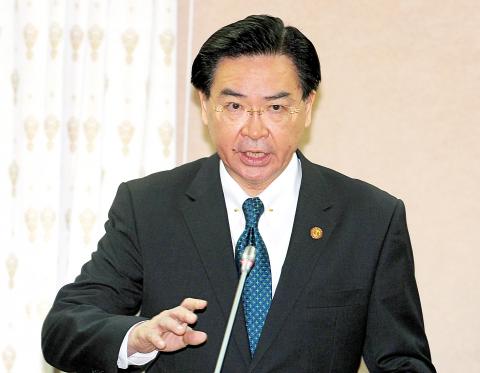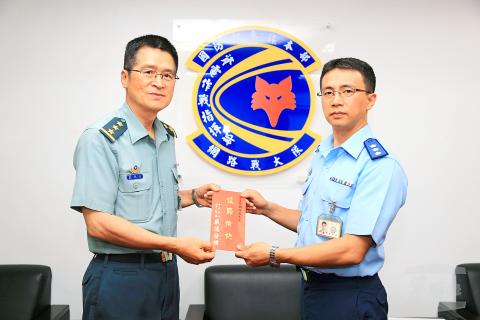President Tsai Ing-wen (蔡英文) has named National Security Council (NSC) Secretary-General Joseph Wu (吳釗燮) to be the Presidential Office secretary-general, the Presidential Office announced yesterday.
Council adviser Yen Teh-fa (嚴德發), a retired army general and former chief of the General Staff from 2015 to last year, was named as Wu’s successor as head of the council.
Wu and Yen are scheduled to assume their new posts next week, Presidential Office spokesman Alex Huang (黃重諺) said.

Photo: CNA
Wu is replacing Lin Bih-jaw (林碧炤), who resigned on Oct. 20 last year to focus on his writing.
Huang said Wu is an experienced hand at cross-strait affairs who has successfully led the council through the transition period and effectively navigated the international relations challenges that arose from the changing political situation in the region.
During the administration of former president Chen Shui-bian (陳水扁), Wu served as chairman of the Mainland Affairs Council and as the nation’s representative to Washington. He later served as Democratic Progressive Party secretary-general and the party’s representative to Washington, before being appointed to the council last year.

Photo: courtesy of the Military News Agency
Tsai has praised Wu’s professionalism and calm performance, Huang said.
Yen established a broad professional portfolio during his four decades of military service, with a successful track record in bolstering the military’s emergency response capabilities and raising the reputation of the armed forces, Huang said.
Yen was appointed to the council’s top post because his professional abilities would be relied upon to assist the government in devising national defense and homeland security policies, Huang said.

Intelligence agents have recorded 510,000 instances of “controversial information” being spread online by the Chinese Communist Party (CCP) so far this year, the National Security Bureau (NSB) said in a report yesterday, as it warned of artificial intelligence (AI) being employed to generate destabilizing misinformation. The bureau submitted a written report to the Legislative Yuan in preparation for National Security Bureau Director-General Tsai Ming-yen’s (蔡明彥) appearance before the Foreign Affairs and National Defense Committee today. The CCP has been using cognitive warfare to divide Taiwanese society by commenting on controversial issues such as Taiwan Semiconductor Manufacturing Co’s (TSMC, 台積電) investments in the

HELPING HAND: The steering committee of the National Stabilization Fund is expected to hold a meeting to discuss how and when to utilize the fund to help buffer the sell-off The TAIEX plunged 2,065.87 points, or 9.7 percent, to close at 19,232.35 yesterday, the highest single-day percentage loss on record, as investors braced for US President Donald Trump’s tariffs after an extended holiday weekend. Amid the pessimistic atmosphere, 945 listed companies led by large-cap stocks — including Taiwan Semiconductor Manufacturing Co (TSMC, 台積電), Hon Hai Precision Industry Co (鴻海精密) and Largan Precision Co (大立光) — fell by the daily maximum of 10 percent at the close, Taiwan Stock Exchange data showed. The number of listed companies ending limit-down set a new record, the exchange said. The TAIEX plunged by daily maxiumu in just

INVESTIGATION: The case is the latest instance of a DPP figure being implicated in an espionage network accused of allegedly leaking information to Chinese intelligence Democratic Progressive Party (DPP) member Ho Jen-chieh (何仁傑) was detained and held incommunicado yesterday on suspicion of spying for China during his tenure as assistant to then-minister of foreign affairs Joseph Wu (吳釗燮). The Taipei District Prosecutors’ Office said Ho was implicated during its investigation into alleged spying activities by former Presidential Office consultant Wu Shang-yu (吳尚雨). Prosecutors said there is reason to believe Ho breached the National Security Act (國家安全法) by leaking classified Ministry of Foreign Affairs information to Chinese intelligence. Following interrogation, prosecutors petitioned the Taipei District Court to detain Ho, citing concerns over potential collusion or tampering of evidence. The

‘COMPREHENSIVE PLAN’: Lin Chia-lung said that the government was ready to talk about a variety of issues, including investment in and purchases from the US The National Stabilization Fund (NSF) yesterday announced that it would step in to staunch stock market losses for the ninth time in the nation’s history. An NSF board meeting, originally scheduled for Monday next week, was moved to yesterday after stocks plummeted in the wake of US President Donald Trump’s announcement of 32 percent tariffs on Taiwan on Wednesday last week. Board members voted to support the stock market with the NT$500 billion (US$15.15 billion) fund, with injections of funds to begin as soon as today. The NSF in 2000 injected NT$120 billion to stabilize stocks, the most ever. The lowest amount it